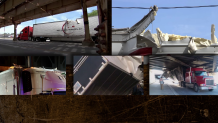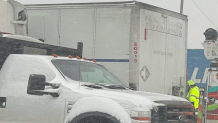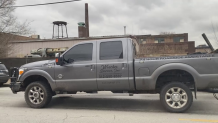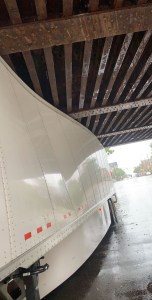Chicago is known as a premier freight hub in the country, at the heart of the nation’s trade, but it is also starting to develop an unsavory reputation among some of the nation’s trucking companies.
Truck drivers tasked with delivering the consumer goods we rely on each day – from groceries to electronics – believe they were targeted in the city after driving straight into an elaborate predatory towing ploy by some companies, costing them tens of thousands of dollars.
That ploy starts with a truck driver’s mistake: driving through one of the city’s many viaducts or overpasses – often in inclement weather – that is too low for their trailer to pass through. Before they realize it, the truck’s trailer is wedged underneath.
In this line of business, and with Chicago’s notable sprawling and intricate infrastructure of roads and bridges, trucking companies said this situation comes with the territory and is bound to happen.
What happens next, though, is neither written in their playbooks, nor in line with industry standards.
Out of nowhere, and called by no one, the truck drivers say tow trucks appear, unsolicited and illegally, offering claims of relief in an anxiety-filled moment.
The drivers tell NBC 5 Responds that relief came with a high price, one they didn’t agree to, totaling tens of thousands of dollars for a tow that they’re told at first would cost hundreds.
Once their trailers are hauled away, the drivers report it taking days before they can get it back from an unknown location, leading to cargo delivery delays and upset customers; another blow to the reputation these companies rely on to do business.
In some cases, the drivers resorted to calling area police in search of their trailer.
“They held it hostage,” one driver told state investigators.
The ordeal has left some truck drivers and transportation companies telling NBC 5 Responds they’re now thinking twice before taking routes that go through the winding Windy City again.
For months, NBC 5 has been combing through police reports and state investigations from the last five years, many containing nearly identical narratives from trucking companies.
Adding insult to injury, state regulators admit there is only so much they can do.
“Our hands are tied in some ways,” said Britney Bouie, Director of Communications for the Illinois Commerce Commission, the state agency tasked with regulating tow companies. “Federal legislation preempts a lot of our abilities to be stricter on some of the [towing] regulations here in the state of Illinois.”

Without new federal legislation to combat predatory towing actions more broadly, experts believe the problem will persist, and the costs will trickle down to consumers on the items we pay for each day.
“That’s going to flow right back to American consumers,” said Matthew Smith with the Coalition Against Insurance Fraud. “And that’s the tragedy that we’re dealing with here.”
“They are predicting there will be a victim.”
On a snowy Valentine's Day afternoon this year, a truck driver from California named Heber Velasco was towing a cargo-load of spicy chips from Tijuana, Mexico to Chicago’s grocery store shelves.
NBC 5 Responds and Telemundo Responde interviewed Heber about the Valentine’s Day incident while he was on the road in another state.
Heber said he was making good time on his route when he approached the Brighton Park overpass in the area of 2500 W. 35th Street.
Just before driving through the tunnel under the viaduct, Heber said he saw a tow truck parked to the side. The driver’s side door read “Wrecker Services."
Heber said he noticed the clearance sign on the bridge, indicating how tall it is, and immediately realized his truck was too tall to go through. But Heber said the driver of the Wrecker Services truck waved him through, assuring him he could make it.
“I think I'm not going to be able to get through,” Heber said in his first language. “And they speak Spanish to me, which gave me confidence, and they tell me, ‘Yes, you’re going to be able to go through, go ahead.'"
Heber said he proceeded forward when he heard the sound drivers in his line of work fear most: the screeching of his trailer’s metal roof caught under the overpass.
“I said, ‘Well, maybe he is a good Samaritan,' so I move forward,” Heber explained. “When the trailer starts to get in, everything is fine, and suddenly it gets stuck.”
As Heber got out of his trailer cab to inspect the damage, he said he was approached by the Wrecker Services truck driver, who assured him help was on the way.
Heber said he repeatedly declined the tower's assistance, as his trailer’s roof was only lightly damaged and he was less than a mile from his destination.
Chicago Police dispatch records show there were no 9-1-1 calls that day reporting an accident in the area. But what happened next was detailed in a police report Heber filed later that day.
Heber said Wrecker Services towed the trailer without his permission, and when Heber went to the locations that the tow company said his trailer would be towed to, he found the addresses were to a gated-up yard where his trailer was nowhere to be found. The tow company's main address was to a post office box in Little Italy.
Heber later reported his trailer as “stolen” to Chicago police and, according to the police report, he explained to officers he repeatedly told Wrecker Services “he did not want their services,” but the company “drove off with the trailer without [his] authorization.”
Heber also said the tow truck company was not called by him, or the company he was contracted to drive for.
In Illinois, unsolicited tows are against the law and drivers could face a felony charge, unless “the owner or operator signals the tower for assistance” at the scene of the accident, which Heber said he did not do.
According to the Chicago police report, when investigators followed up with Wrecker Services, an employee said the company had “an agreement… signed by [Heber]” to tow the trailer.
Heber said he never signed anything.
“I did not sign it,” Heber said. "It had a signature that was not mine."
Chicago police closed the case as "unfounded" and the investigator writing that the case seemed to be a “civil matter.”
The owner of the company Heber was hired to drive for believes that was a mistake.
“Wrecker Towing company came and asked us for service. We declined,” said Mario, the owner of the company that hired Heber for the chip delivery.
If the collision and run-in here is unsettling, what came next when Mario stepped in to try and find his freight was another big shocker: a demand for $17,000.

“That day, [it] should have been $500 to get the trailer underneath the viaduct,” said Mario, recounting what a Wrecker Services employee told Heber that Valentine’s Day under the viaduct. “It was pretty much held ransom.”
Mario said Wrecker Services insisted that it would only accept cash, but eventually conceded to a $15,000 credit card payment. Mario said he’s currently disputing the charge with his credit card provider.
NBC 5 Responds discovered the towing company shouldn’t have been operating that day.
Records from the Illinois Commerce Commission show Wrecker Services’ safety relocator license was revoked on Feb. 9, 2022, five days prior to Mario and Heber’s tow on Valentine’s Day.
A spokesperson for the ICC confirmed the company’s license was suspended after it failed to pay fines levied by the state tied to another instance where the company did not provide fees upfront to a towing customer.

Wrecker Services did not respond to NBC 5’s repeated requests for comment on this story.
When NBC 5 got a hold of someone for the company by phone, the representative said, “I have nothing to say to NBC News. How about you give me a call whenever you need a tow, boss?”
Mario said he believes the whole thing was orchestrated and, given the tow company was already on-scene at the time of the accident, he believes it and other rogue towers are watching these types of viaducts.
“They are professionals,” Mario said. “They drive constantly throughout, in and out of these viaducts… looking for money.”
“Our hands are sort of tied.”
Mario and Heber’s experience is not isolated, nor is Wrecker Services the only towing company to face these kinds of complaints.
NBC 5 spoke with trucking companies – both in and out of state – who filed similar complaints with state regulators involving a variety of other tow companies, including Allyson Nutt with Phoenix Truck Lines in Missouri, whose driver found themselves stuck under an overpass on the 800 block of W. 49th Place back in 2019.
“They basically overwhelmed my driver with multiple tow trucks," Nutt said. “They presented him with an over $10,000 bill.”
Nutt said her company is now avoiding jobs that take her drivers through Chicago, based on the experience.
Mohammed Al-thihabawy with Great Lakes Logistics in Michigan can also relate.
Al-thihabawy said after his driver struck an overpass near South Kedzie and West 21st Street in 2019, he was swarmed by tow truck companies that neither he nor his driver requested, charging a fee they never agreed to.

“The bill was around ten grand, and that’s a lot of money,” said Al-thihabawy. “I wasn’t able to pay it and our customer was like, ‘Hey where’s our freight?’"
In both Nutt and Al-thihabawy's cases, complaints were filed with the state, but the tow companies involved were not cited by regulators.
Thinking back on the experience now is difficult and angering, Al-thihabawy said.
“It was just pain,” Al-thihabawy said. “Mentally, everything just hurts.”
After combing through state and local police reports, NBC 5 Responds found case after case from truck drivers in nearly identical situations.
Tow companies that “showed up without us calling them,” an ICC complaint investigation from 2019 reads. “They stole my load and are holding it hostage for almost $10,000.”
Some truck drivers reported to the state that they were charged upwards of $34,000 to $40,000 for services they did not consent to.
In a majority of the cases, ICC Police investigators indicated there was nothing they could do given the stage agency does not regulate towing prices.
“Our hands are tied in some ways,” said Britney Bouie with the ICC.
In an interview with NBC 5 Responds, Bouie explained the state is limited in what it can and can’t do when it comes to enforcement efforts on private tow companies.
“It is illegal for tow companies to come up to a vehicle, to a driver unsolicited,” Bouie said, acknowledging that it still happens.
The ICC explained that while unsolicited tows are banned in the state, the ICC is not the agency responsible for enforcing that law. Local police are responsible for that kind of enforcement, the agency said.
As for fees, a towing company can be fined for not providing a detailed “safety towing pre-tow disclosure form” prior to services rendered. For that violation, if a guilty verdict is rendered by an Administrative Law judge, the fine is $100 based on previous judgments reviewed by NBC 5 Responds.
The ICC acknowledges that it’s only a slap on the wrist, and it’s exploring ways to potentially raise those fines in the future.
“We're actually exploring the ability to increase those fines,” Bouie said. “But obviously, that takes some time to get that regulation passed… We are not lobbyists, we are not lawmakers. And so we work within the confines of the law.”
The ICC stressed that consumers need to know their rights and what to do before they find themselves in need of a tow. To read the ICC's guidance, click here.
Bouie acknowledged that compared to other states, Illinois actually has robust laws in place to regulate the towing industry, but those state laws can only go so far.
“Illinois does have a safety towing law, and we're pretty robust compared to a number of states,” Bouie said, adding that there is a caveat.
“There is federal legislation, and a good portion of that federal legislation preempts a lot of our abilities to be stricter on some of the regulations here in the state of Illinois.”
Stricter federal laws reigning in these types of towing practices nationwide is exactly what the trucking and insurance industries are currently fighting for.
“This is not just a Chicago problem, although Chicago with the low-hanging bridges does create opportunities for predatory towing,” said John Lynch, Senior Vice President of the American Trucking Association.
Representing the trucking industry, Lynch said point blank: new federal laws are needed to regulate fees, and target bad towing actors as a whole, rather than case-by-case or a game of “whack a mole”.
Lynch said, “I think it’s going to take legislators to step forward and pass laws with teeth.”
Some call them "wrecker chasers," others predatory tows. The insurance industry labels them a problem for all consumers.
“It’s easy to think, ‘Well this is a problem for trucking companies, insurance companies,’ they have money, let them handle it,'" said Matthew Smith with the Coalition Against Insurance Fraud. "Insurance fraud is a crime we all pay for."
Smith explains in a lot of these cases playing out across the country, a trucking company’s insurance coverage may pick up the exorbitant fees, but those fees will come back to haunt those companies, and consumers.
“This is a huge issue. It's an issue in Chicago. It is a problem that is increasing across the United States,” Smith said.
“We have a supply chain issue within the country, as we all know, and we have inflation. And this just adds to it,” Lynch told NBC 5 Responds.
“There is a trickledown effect to the everyday American that they are paying for this stuff,” Lynch added. “Until there are laws in place with real, strict rules that are strictly enforced, these [towing] companies have every incentive to continue these actions.”



